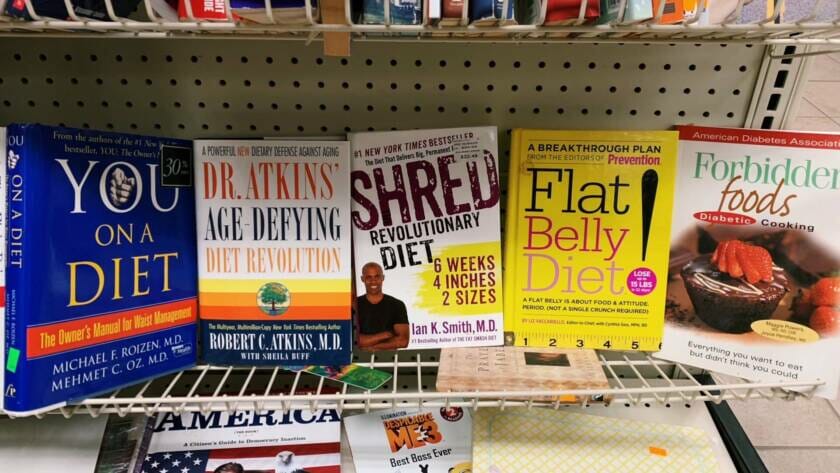As a future dietitian who wants to specialize in helping people heal their relationship with food, taking an anti-diet, intuitive eating, food-freedom approach is very important to me. Diet culture runs rampant in our society and is very good at disguising itself. In this section of my blog, I’m going to be making various posts about tips to break free from diet culture, how to recognize unhealthy diet advice, finding food freedom, etc.
This first post in this series is a good overview of fad diets as well as the negative effects of constant restriction.
The word “diet” has multiple definitions according to the Merriam-Webster dictionary. Here are a few:
Diet (definition D): “a regimen of eating and drinking sparingly so as to reduce one’s weight”
Diet -verb- (definition 2): “to cause to eat and drink sparingly or according to prescribed rules”
Diet -adjective- (definition 2): “promoting weight loss (as by depressing appetite) // diet pills”
These definitions have one common theme: they promote restrictive eating, weight reduction, and food rules.
I’m going to talk about why diets don’t work. But first, let me briefly define a fad diet. A fad diet is a diet that becomes increasingly popular, particularly on social media, for some amount of time. We might see celebrities or well-known health influencers promoting a fad diet by sharing short-term success stories that have come out of it. When the diet starts to gain popularity, more people are talking about it, trying it out, and posting about their experiences on social media. To give some examples of what I’m talking about, here are a few fad diets that I can think of off the top of my head**:
Keto
Paleo
Whole 30
Weight Watchers
Vegan
Intermittent Fasting
Gluten-free
**Before I continue, I want to add a quick disclaimer: in some cases, there are certain reasons that a specific diet must be followed. For example, many people with Crohn’s Disease or Ulcerative Colitis benefit from following a Paleo or Specific Carbohydrate Diet (SCD). They often have to eliminate certain foods to keep their symptoms under control. Likewise, people with celiac disease have to follow a gluten-free diet because their small intestine does not have the ability to absorb gluten. When medically necessary, eliminating certain foods or food groups might offer the best solution for symptom relief.
All of these diets I mentioned above have one thing in common: they take away or restrict certain foods or food groups, with the intention of weight loss or body transformation. There’s one problem with this though: in more cases than not, restriction leads to binging, and it creates a vicious cycle. Think of it as a bow and arrow. Every time you tell yourself “I can’t eat that,” you pull the string on the bow back a notch. The more you say it, the further the string is pulled, gathering power. Finally, when you get to the point where you can’t pull the string any more, and the arrow is released with great force, and you lose control. This is why diets fail.
If you cut out added sugars from your diet, you’ll notice that you can’t stop thinking about sugar. You might make it all day without sugar and then when the nighttime hits, you find yourself uncontrollable in the snack cabinet eating as many Oreos as you can while telling yourself “I’ll do better tomorrow.” Or, you might even make it a few days or weeks before you give in, and when you do, you’ll find yourself feeling out of control. Then, it’s all downhill from there. No matter what you restrict, you’ll likely find yourself having a deep desire to eat that food and when the desire takes over, you eat way more than you intend to and are left feeling guilty and shameful. You continue to tell yourself “I’ll do better tomorrow” or “I’ll get back on track on Monday” but you find yourself re-living this vicious cycle of food guilt over and over.
The problem is, when we create food rules for ourselves, we create friction between what the mind thinks it wants and what the body really needs. You might trick your mind into wanting to restrict a certain food group such as grains or sugars, but when we do the body will begin to crave them intensely.
This leads us to a question: how do we fix our relationship with food so we can feel at peace with all foods and not feel out of control? How do we do this when diet culture wants us to do exactly the opposite?
You need to know that it’s not an overnight process. Developing a healthy relationship with food and un-learning the toxic diet-culture methods that you’ve always known takes time. Remember that it’s not always linear—some days, you might feel like you’re making great progress but other days you might feel like you’ve walked backward. If you’ve been restricting certain foods for a long time, it’s normal to feel fear over the idea of eating them again and fear of losing control. But the thing is, when you stop completely restricting foods, your mindset will also begin to shift away from feeling out of control. Here’s an example:
Restriction mindset- You tell yourself that you can’t eat a single cookie because they are bad. Even though you’re telling yourself you can’t have a cookie, you keep thinking about it until finally you crack and eat 7 cookies in one sitting. Then, you feel like you have no self-control, and that you need to restrict even more to “get back on track.”
Food freedom mindset- You tell yourself it’s okay to have a cookie. You eat a cookie or two after dinner and you enjoy it and feel satisfied. You know that cookies aren’t “bad” and therefore don’t feel the need to indulge as if you’ll never have one again.
Any type of diet that cuts out foods (which is all of them) is going to continuously send you back into the restriction mindset. The restriction mindset creates a binge mindset. And that is why diets fail.
Diet culture tells us that our weight and how our bodies look is the only determining factor of our health status when in reality, there are numerous factors that play a role in health. While it is important to maintain a healthy weight over time and eat a diet that is balanced with fruits, vegetables, whole grains, legumes, protein, etc, there are still other factors that determine someone’s health. Some of these factors include genetics, physical environment, food security/socioeconomic status, access to healthcare, and mental wellbeing. Diet culture is sneaky. They lure people in and then spit them back out feeling inadequate, insecure, and mentally drained. By telling us that our weight is the only determinant of health, diet culture tries to sell us “quick” fix products like expensive shakes or 1200 calorie meal plans. It tells us that we need to cut out entire food groups in order to see any progress. These practices promote crash dieting or “yo-yo” dieting, which is where someone loses weight, gains it back, loses it again, gains it again, etc. This actually harms the body’s natural metabolism. But then diet culture tries to make us feel like it’s our own fault that we can’t break out of the cycle. There’s a reason that the diet industry is worth $70 billion dollars. Not million, but billion.
Diet culture has been around for a long time, and the fact of the matter is, it’s not going anywhere anytime soon. If you’re struggling with your relationship with food and trying to find peace with your body, the best thing you can do is to keep pushing. Keep fighting for recovery.
To close this post, I want to leave you with 3 things to think about when it comes to starting (or continuing) your journey to food-freedom.
- Health looks different on everyone. If we all ate the same and exercised the same, we’d still look completely different. Likewise, a food-freedom journey is going to look different for different people. Comparison can lead to insecurity and unfulfillment. Focus on your own journey and what it means to you rather than glamourizing someone else’s journey. You might look at someone and think they have it all together, but chances are they might be struggling just as much as you are.
- Remember why you started. Remembering your “why” goes far beyond your food-freedom journey- it can be applied to almost any aspect of life. Why did you start that particular job? Why did you move to that city? Why do you love the type of exercise you choose to do? When you start to feel yourself struggling with food or slipping into disordered thoughts, remembering your “why” can be an empowering way to remind yourself how far you’ve come and that recovery is worth it.
- Food means so much more than just physical health. The body thrives off of essential nutrients found in fruits, vegetables, beans, whole grains, lean proteins, etc. But it also thrives off of ice cream dates with your best friend. Dinner dates with your significant other. Sunday brunch with your parents. Margaritas to celebrate making it through a long week. While yes, food has an impact on physical health, it also has an impact on mental health. Restricting certain foods might mean missing out on memorable experiences with loved ones, and that is when you know that your food rules have taken over your life.
This concludes my (lengthy) intro to fad diets and diet culture. The truth is, there are so many layers to these subjects and it’s impossible to talk about them in just one post. I’ll be making more posts about ditching diet rules, finding food freedom, and the layers that go into them. I hope you’ll stop by again!

